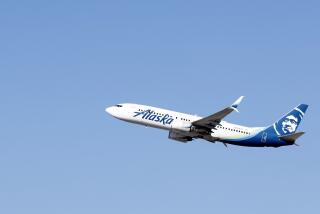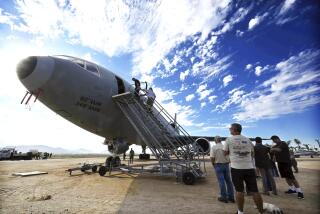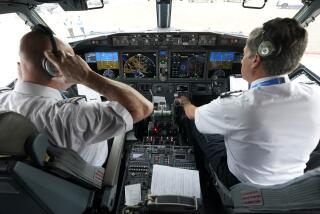Pilot Screening System ‘Isn’t Broken,’ Doesn’t Need Fixing, Experts Say
Aberrant pilot behavior is so rare that further psychological screening probably is not needed to prevent air disasters, several aviation safety experts agreed Wednesday.
“I think the present system is adequate,” said Gene Doub, a veteran air crash investigator with the Transportation Safety Institute in Oklahoma City. “It’s a touchy area to regulate.”
Nonetheless, at least two experts said that if isolated incidents of apparent pilot suicide become a matter of public concern, then the issue should be addressed.
“What the traveling public wants is a safe flight,” said Jim Burin, a director at the Flight Safety Institute in Virginia. “Whether it’s a mechanical problem or a psychological problem is a moot issue to them.”
Added Jim Burnett, a former chairman of the National Transportation Safety Board: “You could have a more aggressive program of medical and mental health screening.”
Inquiry Focuses on Co-Pilot
The cause of the Oct. 31 EgyptAir crash has not been determined, but investigators are focusing on the behavior of Gamil Batouty, one of the Boeing 767’s co-pilots.
It was his voice, saying a prayer, that apparently was picked up by the plane’s cockpit voice recorder seconds before the jetliner began a dive that approached supersonic speeds.
About 90 seconds later, the jumbo jet plunged into the ocean 60 miles south of Massachusett’s Nantucket Island, killing all 217 on board.
“If a pilot accumulates stress in his life with which he can no longer adequately cope, he may engage in self-destructive acts,” two doctors--Robert E. Yanowitch and Stanley R. Mohler--wrote in an FAA study done almost 20 years ago.
Pilot suicide has been blamed in at least three other commercial airline crashes in the 1990s. One involved an Air Botswana ATR turboprop last month, another a Silk Air Boeing 737 in 1997 and the third an Air Maroc ATR turboprop in 1994.
Measured against the tens of thousands of commercial flights that take off each day, these incidents are extremely unusual. So unusual, in fact, that many air safety experts think the present system--which involves psychological testing when a pilot is hired, followed by casual one-on-one evaluations every six months and constant monitoring by aviation peers--probably is adequate.
Rules Exist, but Airlines Get Latitude
“Nothing like [pilot suicide] has ever happened on a U.S. carrier, so far as I know,” said Barry Schiff, a retired TWA pilot and air safety consultant. “Do we really need to fix something that isn’t broken?”
Federal Aviation Administration rules set medical and psychological standards for the examination of commercial pilots. International aviation agencies set similar standards.
The FAA rules state that a pilot must not have a medical history or a clinical diagnosis of a severe personality disorder, a bipolar disorder or a psychosis that has manifested itself in “delusions, hallucinations, grossly bizarre or disorganized behavior or other commonly accepted symptoms of this condition.”
In addition, a pilot must be free of drug or alcohol dependence and of any “personality disorder, neurosis or other mental condition” that might render the person unable to fly safely.
The airlines are given wide latitude on how to assure the mental well-being of their pilots.
EgyptAir declined to discuss its psychological screening programs, but representatives of several other airlines said the process usually begins before a pilot is hired.
Andy Plews, a spokesman for United Airlines, said pilot candidates are subjected to a lengthy written examination and various oral examinations, several of them by medical doctors.
Although the tests are not specifically psychological, Plews said, they include a number of questions about the candidate’s personal life and preferences designed to elicit responses indicative of his or her mental health.
Once hired, airline pilots are seen by an FAA medical examiner every six months. Although designed primarily to assure that a pilot is physically qualified to fly, the examination also is intended to assure that pilots are psychologically fit.
“The pilot and I chat naturally, and if there’s anything going on [that might indicate a problem], or if the guy looks different from the last time I saw him, I ask him about it,” said Dr. Bill Brath, an FAA aviation medical examiner based at Los Angeles International Airport.
“If anything leads in a particular direction, we follow that up,” Brath said. “If there’s a problem, we send the pilot to an aviation psychologist. That happens once in a while.”
Schiff and Lew Aaronson, a retired Continental Airlines pilot, said TWA, Continental and a number of other airlines have “professional standards committees” staffed by pilots on a volunteer basis.
‘Under a Microscope’ With Every Flight
“If a pilot is flying with another guy and he notes aberrant or dangerous behavior, or a family or drinking problem or something like that, he’ll report it to the committee,” Schiff said. “If his peers find it’s a real problem, they’ll try to work it out with the guy. If he’s not responsive, they’ll turn him in to the company.”
“You might want pilots to go in and have a fireside chat with a shrink once a year, but I don’t think you need that,” Aaronson said. “Every time you sit in a cockpit with another pilot, you’re being evaluated. You’re under a microscope the entire time you’re in the workplace.”
“Just look at the figures,” said a nationally known expert in cockpit behavior who asked not to be named because of the controversy swirling about EgyptAir Flight 990. “The present system works pretty well. I’m not sure there’s any better method of preventing this sort of incident.”
Malnic reported from Los Angeles and Alonso-Zaldivar from Washington.
More to Read
Sign up for Essential California
The most important California stories and recommendations in your inbox every morning.
You may occasionally receive promotional content from the Los Angeles Times.









